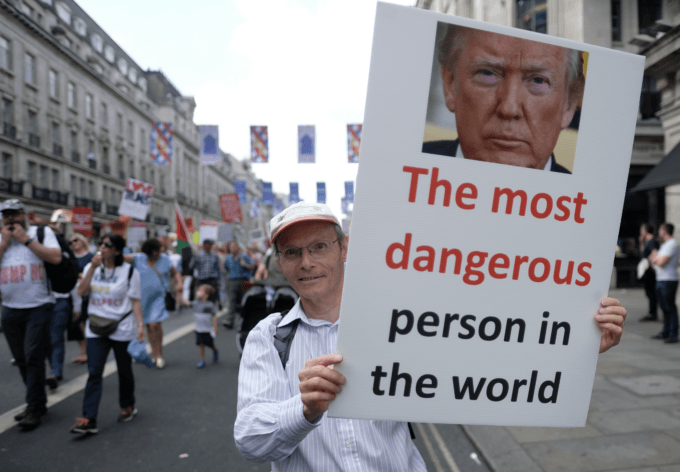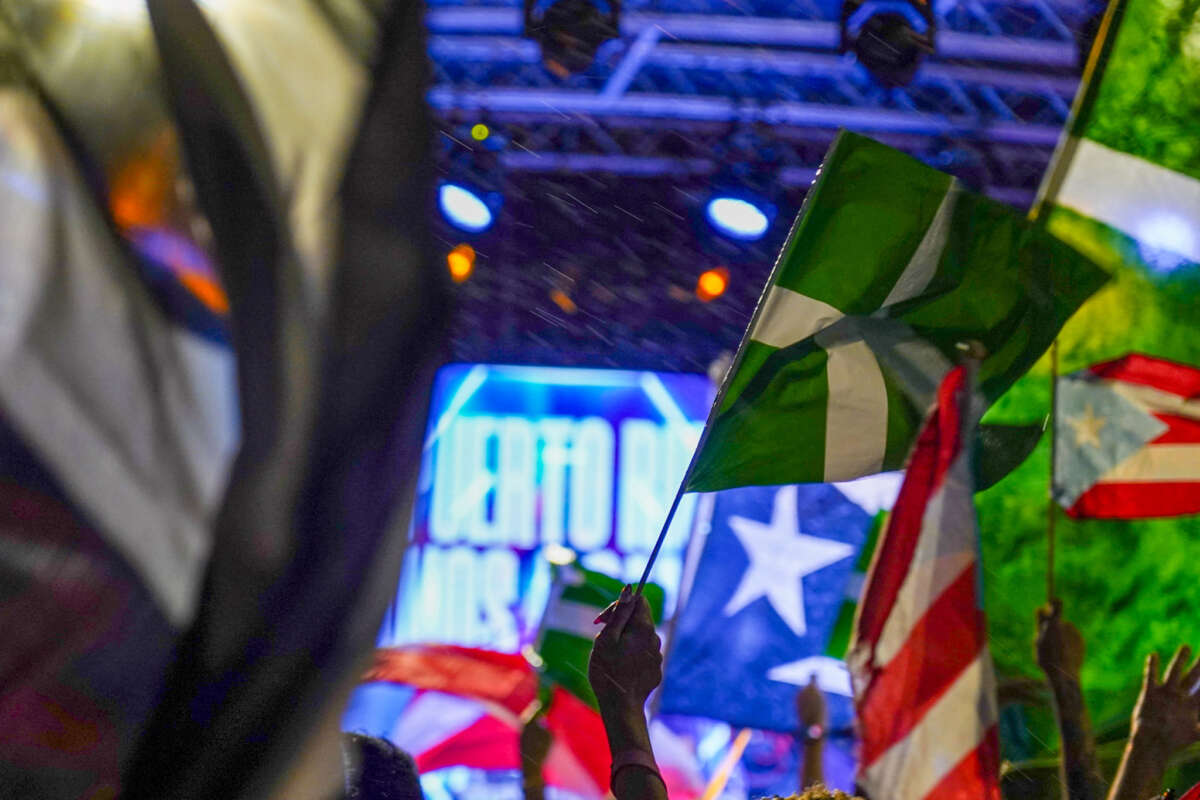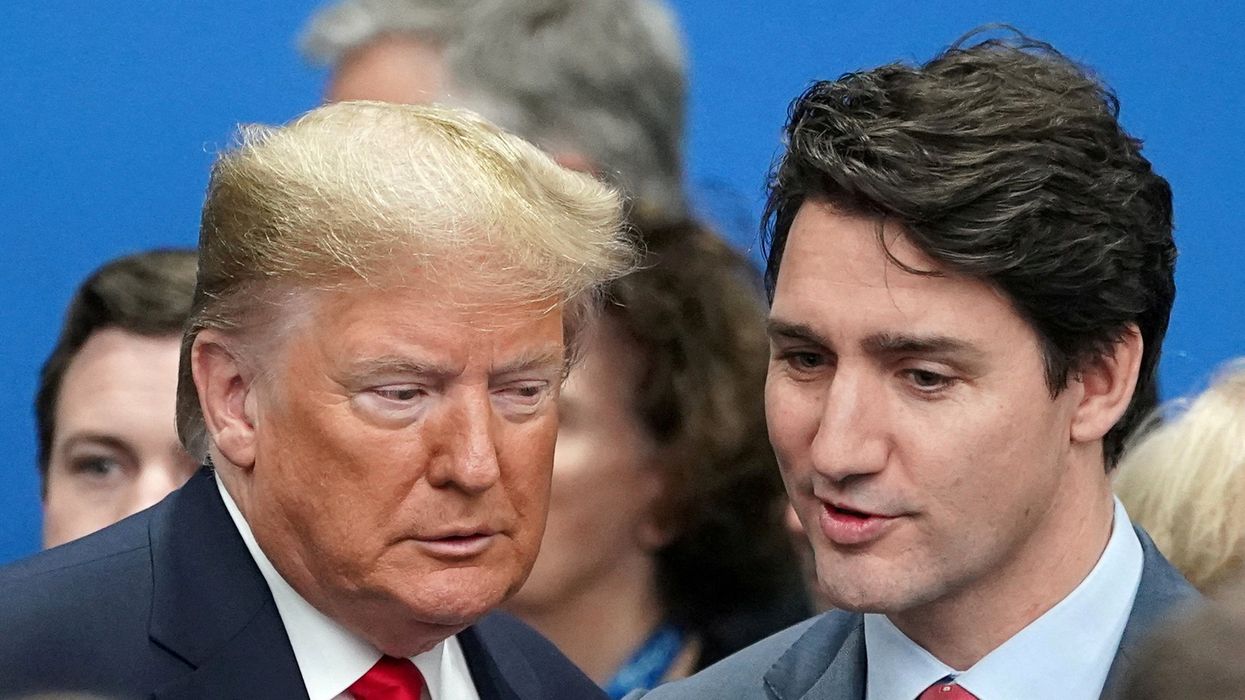Time to Boycott the US?

Image by Alisdare Hickson.
Liberals hate Trump, no question about it. He’s the definition of illiberal: authoritarian, racist, sexist, and downright nasty. Not only that, he’s a living repudiation of the liberal delusion that America runs on meritocracy.
But you want to know a dirty, little secret? In back alleys, encrypted group chats, and off-the-record conversations, liberals will still support Trump on a case-by-case basis. Of course, they’d never vote for the guy, but they’ll give two cheers for some of his policies.
I discovered this ugly truth during Trump’s last term while writing an article on the shift in U.S. policy toward China from lukewarm engagement to hostile decoupling. The general consensus among the foreign policy elite was that, at least in terms of relations with Beijing, Trump was a useful idiot for slowing China’s roll with harsh rhetoric and tariffs.
“Trump is a madman, but I want to give him and his administration their due,” one prominent liberal intellectual told me. “We can’t keep playing on an unlevel playing field and take promises that are never delivered on. It’s really China’s turn to respond, and it’s long overdue.”
It wasn’t just China. For years, liberals and conservatives alike were, for instance, pushing the concept of burden-sharing: getting U.S. allies to cover more of the bill for their security needs. But it was only Trump who really made it happen by blackmailing NATO members and other U.S. partners into doing so.
Sure, few warmed to the idea of the United States actually pulling out of NATO, but even many of our European allies, though they publicly grumbled, were secretly happy about The Donald’s gaiatsu. That’s the Japanese word for outside pressure that enables a leader to force through unpopular changes by blaming it all on foreigners. The self-described liberal leader of NATO, Dutch politician Mark Rutte, even came out in the open after Trump’s reelection to praise the American president for making European countries more militarily self-sufficient.
It wasn’t just liberals who thrilled to Trump’s unorthodox foreign policy during his first term either. Some of those further to the left also embraced Trump the engager (with North Korea’s Kim Jong-un), Trump the isolationist (and his threats to close U.S. military bases globally), and Trump the putative peacemaker (for concluding a deal with the Taliban to end the U.S. military presence in Afghanistan).
Trump, in other words, was not just an unanticipated crisis; he was also an opportunity. Deep in their hearts, anyone unhappy with the status quo will support a disrupter. Quite a few Democrats disgusted with this country’s border policies, inflation, and its coastal elites even crossed over to vote for Trump in November because they wanted change, regardless of the consequences.
Trump 2.0 is going to be the same but worse, like a strong cheese voted out of the refrigerator only to grow ever more pungent as it moldered in a dark corner of Florida. The latest version of Trump has promised more violence and destruction the second time around, from mass deportations to mass tariffs. And he’s planning to avoid appointing anyone to his administration who might have a contrary thought, a backbone to resist him, or the least qualification to enact sensible policy.
In the face of such a vengeful and truculent force returning to the White House, surely, you might think, it will be impossible to find any liberals embracing such anarchy the second time around.
Think again. This is how American politics works, if only for liberals. The modern Republican Party routinely boycotts Democratic administrations: blocking Merrick Garland’s Supreme Court nomination, working overtime to shut down the federal government, voting en masse against legislation it would have supported if introduced by a Republican administration. The MAGA crowd has, in fact, turned noncooperation into something of an art form.
Liberals, on the other hand, pride themselves on bipartisanship, on getting things done no matter who’s in power. So, inevitably, there will be cooperation with the Trump team as it sets about the “deconstruction of the administrative state” (as Trump cheerleader Steve Bannon once put it). Worse, there will even be some silver-lining liberals (and a few leftists) who pull up a seat to applaud the wrecking ball — not perhaps for its wholesale destruction of neighborhoods but at least for its demolition of a select number of buildings that they deem irreparable.
Each time such destruction takes place, the self-exculpatory comment from such silver-liners will be: “Well, somebody had to come along and do something!” If Trump is the only tool in the governing toolbox, some liberals will indeed try to use him to pound in a few nails they think need hammering.
Burning Bridges with China
In his 2024 State of the Union address, Joe Biden argued that he did a better job than Donald Trump of standing up to China. He certainly devoted more Pentagon dollars to containing China. And not only did he not roll back Trump’s tariffs on Chinese products, but he added some of his own, including a 100% tax on Chinese electric vehicles. Biden also made concrete moves to decouple the U.S. economy from China’s, especially when it came to the supply chains for critical raw materials that Beijing has sought to control. “I’ve made sure that the most advanced American technologies can’t be used in China,” he insisted, adding, “Frankly for all his tough talk on China, it never occurred to my predecessor to do any of that.”
Biden’s moves on China, from export controls and subsidies for chip manufacturers to closer military relationships with Pacific partners like Australia and India, received the enthusiastic support of his party. No surprise there: It’s hard to find anyone in Washington these days who has a good word to say about engaging more with China.
So, when Trump takes office in January, he won’t actually be reversing course. He’ll simply be taking the baton-like stick from Biden while leaving all the carrots in the ground.
That said, Trump’s proposed further spike in tariffs against China (and Canada and Mexico and potentially the rest of the world) does give many liberals pause, since it threatens to unleash an economically devastating global trade war while boosting prices radically at home. But trade unions backed by such liberals support such measures as a way to protect jobs, while the European Union only recently imposed stiff tariffs of their own on Chinese electrical vehicles.
So, yes, neoliberals who embrace free trade are going to push back against Trump’s economic policies, but more traditional liberals who backed protectionist measures in the past will secretly (or not so secretly) applaud Trump’s moves.
Back to the Wall
On taking office, Joe Biden rolled back his predecessor’s harsh immigration policies. The rate of border-crossings then spiked for a variety of reasons (not just the repeal of those Trump-era laws) from an average of half a million to about two million annually. However, in 2024, those numbers plummeted, despite Trump’s campaign claims — but no matter. By then, many Democrats had already been reborn as border hawks.
That new, tougher attitude was on display in executive actions President Biden took in 2024 as well as the border security bill that Democrats tried to push through Congress earlier this year. Forget about finding a path to citizenship for the millions of undocumented immigrants who keep the American economy humming, Biden’s immigration policy focused on limiting asylum petitions, increasing detention facilities, and even allocating more money to build Trump’s infamous wall.
As Elora Mukherjee, director of the Immigrants’ Rights Clinic at Columbia Law School, pointed out on the eve of the November election, “What we are seeing is that the center of the Democratic Party is now adopting the same policies, the same postures, that MAGA Republicans were fighting for about six years ago.”
And yet such punitive policies still weren’t harsh enough for MAGA Republicans and their America First followers. The bottom line was that immigration-averse voters didn’t want to support Democrats pretending to be MAGA Republicans. When it came to the White House, they wanted the real thing.
As politics change hands in Washington next January, it’s going to be difficult to find any Democrats who will support the mass detentions and deportations Trump is promising. Yet many liberals, like the unprecedented number of Latinos who pulled the lever for Trump in 2024, do want major changes at the border with Mexico. In Arizona, Democrat Ruben Gallego won a squeaker of a Senate election by emphasizing border security and even backing a border wall (in certain areas). Such liberal border hawks will be happy when the Republican president does the dirty work so that Democrats don’t suffer the political fallout that is sure to follow.
Remapping the Middle East
On the face of it, the Abrahamic Accords were a liberal nightmare. The brainchild of Trump’s son-in-law Jared Kushner, they promised to repair relations between Israel and the major authoritarian regimes in the region: Saudi Arabia, the Gulf States, Morocco, and Sudan. The deal was a reward for illiberal leaders, particularly Israel’s Benjamin Netanyahu. The primary losers would, of course, be the Palestinians, who would have to give up their hopes for a separate state in exchange for some Saudi handouts, and the Sahrawi people who lost their claim to the Western Sahara when the United States and Israel recognized Moroccan sovereignty over the entire region.
Instead of shelving the Accords, however, the Biden administration pushed ahead with them. After roundly criticizing Saudi autocrat Mohammed bin Salman for, among other things, ordering the murder of a U.S.-based Saudi journalist, Biden mended ties, fist-bumping that rogue leader, and continuing to discuss how and when the Kingdom would normalize relations with Israel. Nor did his administration restrict Washington’s staggering weapons deliveries to Israel after its invasion and utter devastation of Gaza. Yes, Biden and crew made some statements about Palestinian suffering and tried to push more humanitarian aid into the conflict zone, but they did next to nothing to pressure Israel to stop its killing machine (nor would they reverse the Trump administration’s decision on the Western Sahara).
The liberals who support Israel (come what may) like Pennsylvania Senator John Fetterman, New York Congressman Ritchie Torres, and the New Democrat Coalition in the House of Representatives are, of course, going to be enthusiastic about Trump’s ever tighter embrace of Netanyahu next year. But there are also likely to be quiet cheers from other corners of the liberal-left about the harder line Trump is likely to take against Tehran. (Remember Kamala Harris’s assertion during her presidential run that Iran was the main adversary of the United States?) The Arab Spring is long gone and a strong man in the White House needs to both schmooze with and go toe to toe with the strong men of the Middle East — or so many liberals will believe, even as they rationalize away their relief over Trump’s handling of a thoroughly illiberal region.
Looking Ahead (Or Do I Mean Behind?)
Anyone to the left of Tucker Carlson will certainly think twice about showing public enthusiasm for whatever Trump does. Indeed, most liberals will be appalled by the new administration’s likely suspension of aid to Ukraine and withdrawal from the Paris climate accord, not to mention other possible hare-brained maneuvers like sending U.S. troops to battle narcotraffickers in Mexico.
Trump will attract liberal support, however quietly or even secretively, not because of his bridge-building genius — in reality, he couldn’t even get a bridge-building infrastructure bill through Congress in his first term — but because all too many liberals have already moved inexorably rightward on issues ranging from China and the Middle East to immigration. The MAGA minority has seized the machinery of power by weaponizing mendacity and ruthlessly breaking rules, in the process transforming politics much the way the Bolshevik minority did in Russia more than a century ago. In the pot that those Republicans put on the stove, the water has been boiling for more than a decade and yet the left-of-center frogs barely seem to recognize just how altered our circumstances have become.
In normal times, finding overlapping interests with your political adversaries makes sense. Such bedrock bipartisanship stabilizes fractious countries that swing politically from center left to center right every few years.
These are, however, anything but normal times and the second-term Trump team anything but center-rightists. They are extremists bent on dismantling the federal government, unstitching the fabric of international law, and turning up the heat drastically on an already dangerously overcooking planet.
In 2020, I raised the possibility of a boycott, divestment, and sanction (BDS) movement against the United States if Trump won the elections that year. “People of the world, you’d better build your BDS box, paint ‘Break Glass in Case of Emergency’ on the front, and stand next to it on November 3,” I wrote then. “If Trump wins on Election Day, it will be mourning in America. But let’s hope that the world doesn’t mourn: it organizes.”
Four years later, Trump has won again. Do I hear the sound of breaking glass?
Here, in the United States, a stance of strict non-engagement with Trump 2.0, even where interests overlap, would not only be a good moral policy but even make political sense. When things go disastrously south, laws are broken, and the government begins to truly come apart at the seams, it’s vitally important that no left-of-center fingerprints be found at the scene of the crime.
Let’s be clear: the Trump administration will not be playing by the rules of normal politics. So, forget about bipartisanship. Forget about preserving access to power by visiting Mar-a-Lago, hat in hand, like Facebook’s Mark Zuckerberg or the hosts of MSNBC’s Morning Joe. “Fascism can be defeated,” historian Timothy Snyder wrote immediately after the November elections, “but not when we are on its side.”
So, my dear liberal-left, which side are you on?
This piece first appeared on TomDispatch.










